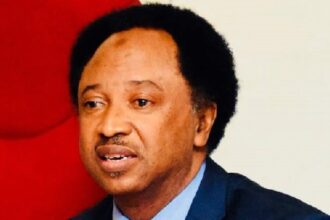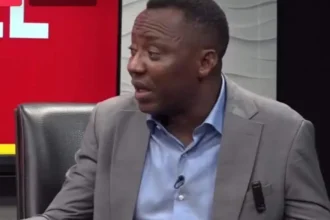President of the Senate, Dr. Bukola Saraki, has described as both false and wicked the swirling reports about likely fuel hike, allegedly being orchestrated by the Senate, saying there is no such intention in the first place.
Saraki, who said he was going to order an official statement to that effect, however dismissed as a lazy type of journalism the habit of taking innocuous reports on the surface and misinterpreting them as if such writers have predetermined motives.
In the same vein, the Senate has said the recommended increase in the pump price of petrol and diesel by N5 per litre, remains a proposal that is yet to be reviewed by the Senate as a whole. The legislative body however assured Nigerians that it would reject any proposal to increase the price of fuel, just as it abolished fixed electricity charges and rejected the hike in hike in data price.
Addressing the issue in an exclusive chat with THISDAY yesterday, Saraki said the story was obviously taken from the report of a public hearing on road maintenance, which suggested taxing the already existing templates of internal inflow, such that would not affect the pump price of petroleum or the end users.
According to him, since appropriation for the road maintenance was no longer feasible and it was important they took care of it, the idea was suggested that they looked inward, perhaps, by reviewing the Petroleum Products Pricing regulatory Agency (PPPRA) inflow template and see the areas the suggested N5.00 could be taken from, albeit in bits.
He said, for instance, the public hearing reports identified some of the steady inflow from the ports in terms of charges, from where some bits could be taken, adding that the overriding instruction was that the N5.00 must not reflect on the pump price or passed down to the consumer in whatever way.
“I am surprised therefore that anybody would take such a report and turned it on its head. Do I call that lazy journalism or what? The report is so false and wicked that you can’t but see the sinister intention in it. The charge to maintain road is in no way a concern to the public because it would not be passed down to them.
“But because anything that is anti-senate sells quickly, nobody bothered to find out the true picture and the negative report sold like wildfire, when indeed, it was the imagination of the writers and possibly their sponsors.
I am going to get Yusuph (his media aide) to issue a statement on this. Whether or not the critics of the Senate like it, we are and will always be pro-masses.
“Whatever this Senate does, even if it appears in the estimation of our critics as anti-people, is done first with the interest of the people factored critically into accounts. We set out ab initio to protect our people and their interest and that has remained our guiding principle. We will not depart from it. Now ask yourself, on what basis will an increase in the pump price of fuel be justified at this period, when you consider the state of the economy?
“Maybe those who sold the story and their sponsors would have an answer. We are not insensate representatives and if that is the impression that some out there want registered in the subconscious of the people about the senate, then, they will try harder. Check out our records and genuinely analyse them, we have consistently been pro-masses of this great country and that is not going to change,” he maintained.
The Senate on its Twitter handle @NGRSenate yesterday said there was no cause for alarm over the issue which had already drawn condemnation from several sections of the country.
The tweets read: “Story about recommended increase in price of fuel remains a proposal. It has not been reviewed by Senate plenary which comprises of all 109.”
“Rest assured senate that abolished fixed electricity charges, halted hike in data price & much more will not support increase in fuel price This recommendation, like all reports, will still be reviewed & debated at plenary in line with Senate procedures and democratic practices.
“Committee Report on funding road was being deliberated, when salient issues arose which led to the stepping down to clarify grey areas. Absolutely no proposal to increase fuel price! What was discussed at public hearing with stakeholders is the need for ways to maintain roads.”
“While everyone agreed on need to set aside a particular amount to fix roads, a proviso was set that price of fuel SHOULD NOT BE INCREASED. Even for purpose of funding road maintenance, we must maintain charges as it exists within the PPPRA template of PMS at 145 Naira.”
The Senate Committee on Works recently presented for enactment by the upper chamber, a proposed law titled: ‘The National Road Fund Establishment Bill’, which is part of the 11 economic reform bills initiated by the Senate and already endorsed by the House of Representatives. The 11 economic recovery bills from where the National Road Fund Bill originated was initiated by the National Assembly leadership to help take the country out of recession.
They are the Petroleum Industry Governance Bill; National Development Bank of Nigeria Bill; National Road Fund Bill; Federal Roads Authority Act (Amendment) Bill; and National Transport Commission (Establishment) Bill.
Others are Nigerian Ports and Harbours Authority Act (Amendment) Bill; Warehouse Receipts Act (Amendment) Bill; Companies and Allied Matters Act (CAMA) (Amendment) Bill; Investment and Securities Act (ISA); Customs and Excise Management Act and Federal Competition Bill.
However, the nine sources identified for generating revenue for the planned National Roads Fund are fuel levy of five naira (N5) chargeable per litre on any volume of petrol and diesel products imported into Nigeria and on locally refined petroleum products, as well as axle load control charges.
There is also the toll fees (a percentage not exceeding 10% of any revenue paid as user charge per vehicle on any federal road designated as a toll road, but not applicable to PPP roads); international vehicle transit charges; and inter-state mass transit user charge of 0.5% deductible from the fare paid by passengers to commercial mass transit operators on inter-state roads.
The bill also recommended road fund surcharge of 0.5% chargeable on the assessed value of any vehicle imported at any time into Nigeria; lease, licence or other fees which shall be 10% of the revenue accruing from lease or licence or other fees pertaining to non-vehicular road usages along any federal road and collected by the federal roads agency.
On the list too are grants and loans, and gifts of land, money or other property. The bill further stated that the National Roads Fund would be established with a high level of independence under the jurisdiction of the Federal Ministry of Finance, which will only oversee the fund for policy direction.
The Senator Kabiru Gaya-led Committee on Works, which processed the bill, said “The National Roads Fund shall set aside an amount not exceeding 3% of the total monies accruing to it in the preceding year as Administrative Fund.”
The bill was recently listed on the Order Paper but could not be considered, because of time constraint. Gaya, a representative of the All Progressives Congress (APC) from Kano State, however pleaded with the Senate to pass the bill to facilitate the nation’s economic recovery.
The committee report was reportedly signed by 15 members and they were Gaya (chairman), Clifford Ordia (vice chairman), Mao Ohuabunwa, Bukar Abba Ibrahim, Biodun Olujimi, Ben Bruce, Gilbert Nnaji, Abubakar Kyari, Ibrahim Danbaba, Mustapha Bukar, Ahmed Ogembe, Sani Mustapha and Buruji Kashamu as members.
Unfortunately, the stories were written in a way that suggested that the end users, in this case the people were to pay for the increase. The import of the proposed fuel levy charge, according to the reports, was that end-users, including motorists, would pay N5 tax on every litre of fuel bought at any fuel station, insinuating that “This will worsen the hardship most Nigerians currently face.”
In a similar development, the Special Adviser to the Senate President (social media), Mr. Bamikole Omishore, in a statement made further clarifications on the matter.
“At the Public hearing on the National Roads Fund Bill the stakeholders were unanimous on the need to access a percentage of the funds for the sustainable maintenance of roads from the pricing template of petroleum products. While the unanimity was on a percentage, opinion varied as to what percentage. Some argued for 25%, 11%, 7% and 5% of the value of the price of the product.
“This position was held strongly since most other African countries have actually implemented an average of N25 surcharge on petroleum products for the maintenance of their roads.
“It was the widely-held view that we may not be able to go that far in view of the economic challenges the country was going through and the need to ameliorate the suffering of the ordinary Nigerian.
“The technical committee in review this submission determined that even at a surcharge of 5% which leaves the value at about N11 (at the current price of PMS) will be untenable not only due to implementation challenge that would have require that at all times, the surcharge will mean an addition burden is placed on Nigerians beyond the cost of the petroleum product.”
“Rather it was agreed that the charge be pegged at N5 (five naira) and implemented within the existing charges template rather than a calculation arrived at in addition to the price of the product.”
“Therefore, what the Senate has adopted is an innovative and most sensitive approach to eliminate the possibility of increasing the price of fuel in order to fund the Roads Fund. Now with what we have the charge on petroleum products for the purpose of funding road maintenance will have to be determined within the charges template as they already existing within the PPPRA template.
“Finally, it’s important therefore to make it clear that there is no ambiguity in what the Senate has done as there will be no one naira added to the current price of fuel as a result of this bill.
“The charge is to be accommodated within the pricing charge template in effect within the PPPRA. What the Senate has adopted is the minimalist approach to ensure that our roads can come back to life.”
“Where we are with our roads and why the need for the National Roads Funds: 77% of our roads are classified as dilapidated and dangerous, one of the highest in Africa. The average in Africa is 25%.”
“A total of 12, 077 road crashes were recorded across the country in 2015, the News Agency of Nigeria notes. Nigeria is ranked second-highest in the rate of road accidents among 193 countries of the world.”
“WHO adjudge Nigeria the most dangerous country in Africa with 33.7 deaths per 100,000 population every year. According to WHO, one in every four road accident deaths in Africa occurs in Nigeria”, he added.









